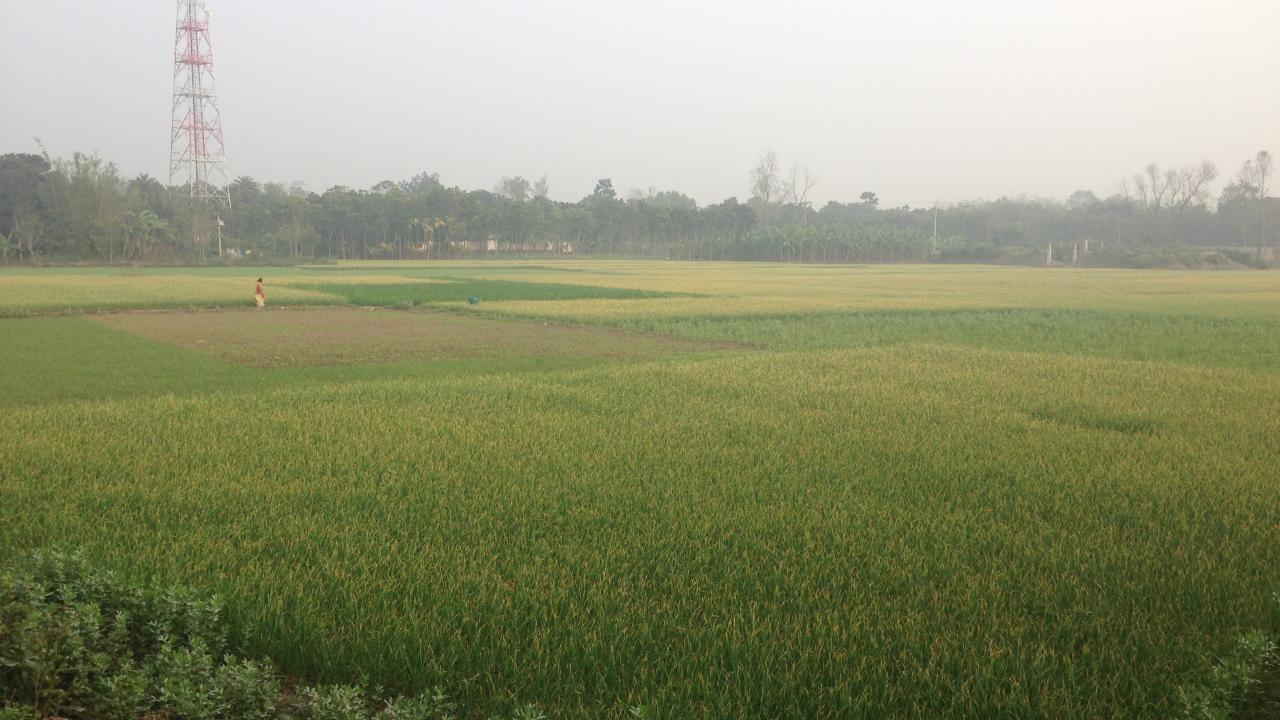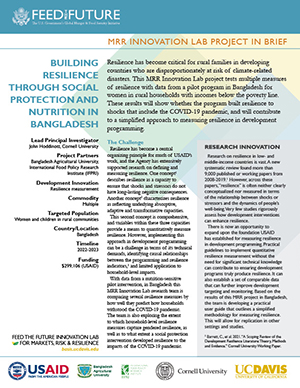
Resilience has become critical for rural families in developing countries who are disproportionately at risk of climate-related disasters. This MRR Innovation Lab project tests multiple measures of resilience with data from a pilot program in Bangladesh for women in rural households with incomes below the poverty line. These results will show whether the program built resilience to shocks that include the COVID-19 pandemic, and will contribute to a simplified approach to measuring resilience in development programming.
Project Overview
Lead Principal Investigator: John Hoddinott, Cornell University
Project Partners: Bangladesh Agricultural University, International Food Policy Research Institute (IFPRI)
Development Innovation: Resilience measurement
Commodity: Multiple
Targeted Population: Women and children in rural communities
Country/Location: Bangladesh
Timeline: 2022-2023
Funding: $299,106 (USAID)
The Challenge
Resilience has become a central organizing principle for much of USAID’s work, and the Agency has extensively supported research on defining and measuring resilience. One concept1 describes resilience as a capacity to ensure that shocks and stressors do not have long-lasting negative consequences. Another concept2 characterizes resilience as reflecting underlying absorptive, adaptive and transformative capacities.
This second concept is comprehensive, and variables within these three capacities provide a means to quantitatively measure resilience. However, implementing this approach in development programming can be a challenge in terms of its technical demands, identifying causal relationships between the programming and resilience indicators,3 and limited application to household-level impacts.
With data from a nutrition-sensitive pilot intervention, in Bangladesh this MRR Innovation Lab research team is comparing several resilience measures by how well they predict how households withstood the COVID-19 pandemic. The team is also exploring the extent to which household-level resilience measures capture gendered resilience, as well as to what extent a social protection intervention developed resilience to the impacts of the COVID-19 pandemic.

Research Design
The Transfer Modality Research Initiative (TMRI), a pilot program implemented in Bangladesh by the World Food Programme from 2012-2014, provided monthly cash or food transfers with and without nutrition behavior change communication (BCC) for women in poor rural households. TMRI was implemented as a randomized controlled trial (RCT) to test its impacts, which showed significant improvements in the well-being of women and children both during and after the program.
This MRR research project expands on this study to build evidence on how to support resilient escapes from poverty with a particular focus on gender and nutrition. With new surveys in communities that participated in TMRI, the research team is testing whether the program enhanced households’ resilience to shocks such as COVID-19. The analysis will also suggest whether more resilient households, however measured, were better able to withstand the effects of the pandemic.
The team is also examining whether women are more likely to be protected from shocks when they live in a resilient household. The original RCT showed that TMRI reduced intimate partner violence while increasing women’s agency as well as their social and community support.4 The MRR team is expanding on these findings to test whether women’s wellbeing and safety is greater in resilient households and whether this result changes depending on the measure of resilience.
This project includes using the rich data collected in the TMRI study and new surveys to test and compare measures of resilience developed and prioritized by USAID and to make these measures technically simpler and more comprehensive. One of these measures is the Ability to Recover from Shocks and Stresses Index (ARSSI), which is used by USAID and Feed the Future with programming in Bangladesh.
Development Impact
The results of this project can help governments in low-income counties develop shock-responsive social protection programs that promote resilience. The broader aim is to advance knowledge on how to quantitatively measure resilience so development organizations such as USAID and local and international NGOs can more easily and effectively evaluate which interventions truly build resilience. This research most immediately contributes to the USAID Bangladesh Country Development Cooperation Strategy Development Objective 3: Strengthened Resilience to Shocks and Stressors.
The Government of Bangladesh is embarking on a multi-year strategy to strengthen the National Social Security Strategy (NSSS). Given that current government interventions include both in-kind (food) and cash transfers, this project’s results provide evidence of the relative effectiveness of different approaches in protecting women and households from the impacts of shocks such as COVID-19.
This work is also strengthening the operationalization of the concept of resilience to enable USAID and its partners to improve monitoring and evaluation. The research team is developing a practical user guide that outlines the simplified methodology for measuring resilience. The goal is to easily adapt and use the instrument across USAID and external sectors and institutions.
[1] Constas, M., et al. 2014. “Resilience measurement principles: Toward an agenda for measurement design.” Food Security Information Network.
[2] Vaughan, E. et al. 2018. Resilience Measurement Practical Guidance Note Series 3: Resilience Capacity Measurement. Mercy Corps.
[3] Upton, J., et al. 2020. “Caveat utilitor: A comparative assessment of resilience measurement approaches.” Cornell University Working Paper.
[4] Roy, S., et al. 2019. “Transfers, behavior change communication, and intimate partner violence: Post-program evidence from rural Bangladesh.” Review of Economics and Statistics.
This report is made possible by the generous support of the American people through the United States Agency for International Development (USAID) cooperative agreement 7200AA19LE00004. The contents are the responsibility of the Feed the Future Innovation Lab for Markets, Risk and Resilience and do not necessarily reflect the views of USAID or the United States Government.
